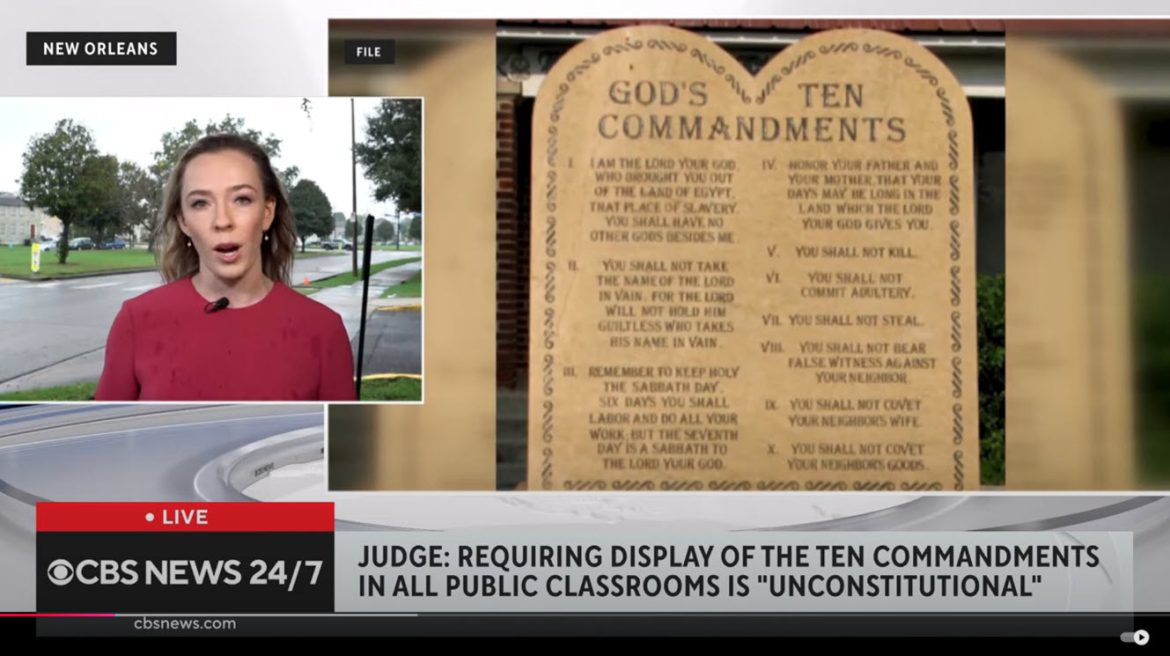A new law in Louisiana requiring the posting of the Ten Commandments in public school classrooms is on hold following a federal judge’s decision. The injunction, issued in response to a lawsuit by civil rights advocates, claims the law violates the constitutional separation of church and state. The lawsuit, spearheaded by groups such as the American Civil Liberties Union (ACLU) and the Freedom From Religion Foundation (FFRF), argues that the mandate endorses religious beliefs within a public education context, infringing on students’ rights to a secular learning environment.
The law, championed by Louisiana Governor Jeff Landry and backed by a predominantly Republican legislative majority, mandates that a framed copy of the Ten Commandments be displayed in all K-12 public classrooms. Landry and other supporters argue that the Ten Commandments serve as a foundational document with historical significance, one that has influenced American legal and ethical standards. Governor Landry contends that these values transcend religious lines and provide students with a moral framework to guide their understanding of civic duty, honesty, and integrity.
“We’re not trying to promote a particular religion,” Landry said in a statement following the ruling. “This is about recognizing the values that helped shape our nation’s laws and character. Children deserve to learn about the foundational principles that helped build America.” Supporters also emphasize that the law permits alternative religious texts if schools feel it provides historical value, aiming to mitigate arguments of favoritism toward specific religious beliefs.
Critics of the law, however, remain skeptical. They argue that any government-endorsed religious display in a public school environment inherently blurs the lines of church and state. “This is a clear overstep,” said Sarah Norris, a lead attorney for the ACLU in Louisiana. “Public classrooms should be spaces of open inquiry, not places where students feel pressured to accept religious teachings.” The legal team highlights that while the Ten Commandments hold cultural significance, requiring their display in all classrooms creates an environment that could alienate students and families of varying or no religious backgrounds.
The injunction from U.S. District Judge Mary Price highlights several precedents set by the U.S. Supreme Court on religious symbols in public spaces, with particular attention to public schools, which are seen as especially vulnerable to implicit state endorsement of religion. In her ruling, Judge Price stated, “The requirement to display the Ten Commandments, even if framed in historical terms, carries with it an implicit endorsement of a religious viewpoint. Public schools, as institutions serving diverse communities, must remain neutral grounds where all students feel equally represented.”
The decision to put the law on hold is temporary but allows time for further examination in the courtroom. The case will continue as civil liberties groups and the state present more comprehensive arguments. Legal experts suggest that the case could ultimately reach the U.S. Supreme Court, given the potential implications for religious freedoms, state autonomy in educational policy, and interpretations of the Establishment Clause.
Louisiana is not the only state grappling with church-state separation issues in public schools. Similar debates are unfolding in other states where lawmakers have introduced measures to introduce religious symbols, such as nativity scenes, or emphasize Judeo-Christian values in the curriculum. These legal skirmishes continue to test the boundaries between religious expression and public schooling, an area where deeply held beliefs frequently intersect with constitutional interpretations.
While Louisiana’s new law remains under judicial scrutiny, the case has reignited national conversations on the role of religion in public spaces and education. Public reactions are mixed, with many parents expressing support for the law as a return to “traditional values,” while others worry it could lead to further religious endorsement in public institutions.
As the legal battle unfolds, Louisiana’s Department of Education has announced it will refrain from enforcing the law until a final decision is made, and local school districts are advised to avoid installing any such displays to prevent potential legal ramifications.
For now, the display of the Ten Commandments in Louisiana classrooms remains a controversial topic that underscores a broader national debate over the separation of church and state and the role of religious values in public education.



